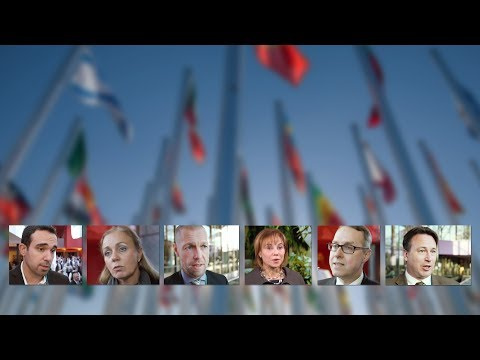What is 'Climate Diplomacy'? The role of foreign and security policy in addressing climate change
Implementing the Paris Agreement and supporting nations to achieve their national climate targets remain a strategic priority of foreign and security policy. Furthermore, climate security risks have to be mitigated, as climate change impacts such as water or food scarcity, land degradation, sea level rise and more exacerbate potential conflicts. Climate diplomacy helps to address causes and consequences of climate change in various ways.
The interviews were conducted at the Planetary Security Conference in The Hague (5-6 December 2016) by Stella Schaller (adelphi). Video production: Paul-Müller Hahl (Lichtbilder Filmproduktion).
"We need a new era of climate diplomacy, one where climate risks are integrated into foreign policy agendas, to prevent the next crisis before it breaks out, and to manage geopolitical changes proactively.
Whether it is terrorism, climate change, transboundary rivers, desertification – none of these abide by arbitrary administrative borders. This is where diplomacy needs to help, and this is where the defence community needs to help, because nation states cannot solve this alone.
It is extremely important to address climate-fragility risks today as part of instability and fragility considerations globally, because we are seeing floods, droughts, extreme weather events, migration of people across borders, as well as sea level rise, and we are going to see increasing challenges globally. In diplomacy, we need to understand how this is changing how we interact with countries. We need to address these risks at the highest diplomatic levels. Following on from the successful Paris Agreement, we need to integrate these into our diplomatic practices worldwide.
Climate diplomacy is what changes the perception of national interest, which then causes countries to give their negotiators different instructions, which means we get better deals.
There are different entry points and approaches to climate diplomacy. Reaching out to the public and to governments is just as important as it is to engage in conflict prevention and peacebuilding. Diplomacy has to use its entire toolbox to address the various impacts of climate change.
In foreign policy, foreign ministers can do a lot. It is often at times very easy to think that all of these have very specific technological solutions and as long as we do those things, we can address these issues. And it is true, there are technological solutions. But if we are not – as we are seeing in the United States – putting this issue on the big kid’s table versus on the little kid’s table, this includes in our foreign ministries and in our defence ministries, in national security councils in places like the US and elsewhere, if it is not at that level and it is just being treated as that little issue the environmental ministers will take care of, then we will never solve the problem.
There are environmental policies to fight against environmental degradation; there are developmental policies to deal with the situations of environmental degradation caused by climate change. Then we have the classic diplomatic tools – when there is a crisis that is already at hand, a loss of stability – mediation, peacebuilding. All that needs to consider climate aspects. If you build a peace in a way that does not consider climate results, your peacebuilding may not be stable, either.
As long as you can promote dialogue and have a fora where these challenges can be discussed – which is the role of diplomacy – if that can be institutionalized, then there is scope to address these problems in a far better way than if these fora do not exist.
And it is not just climate change. It is ecosystem degradation more in general, it is a mix that combines with exclusion of people, it is human rights violations and all of that combines into a toxic cocktail. What that toxic cocktail has, where the foreign office can help, is that it does not respect any nation states.
We need a new climate diplomacy to manage geopolitical changes proactively. An era where diplomats make climate change a political priority. An era of cooperation between diplomats and other branches, and levels, of government, between governments and businesses, and between countries and regions. An era of a new climate for peace."










